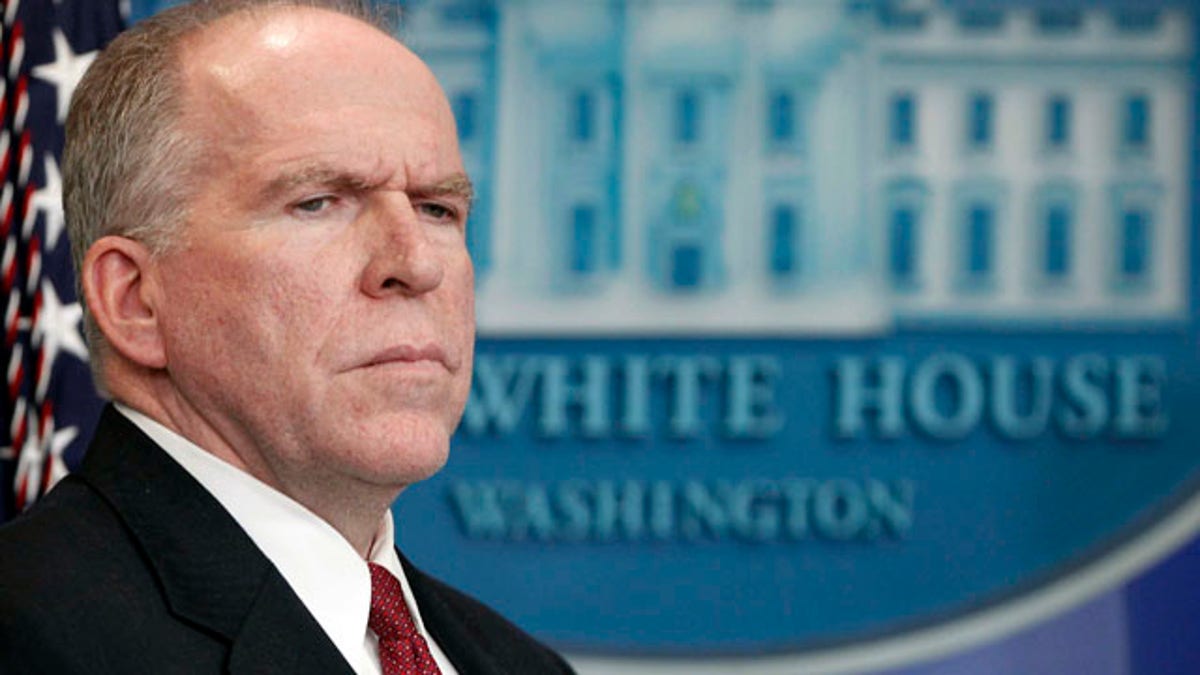
Oct. 29: Deputy National Security Adviser for Homeland Security and Counterterrorism John Brennan briefs reporters at the White House after President Barack Obama made a statement about the suspicious packages found on U.S. bound planes. (AP)
WASHINGTON – Teams of U.S. anti-terrorism and security experts headed for Yemen to help search for suspects in the mail bomb plot and to train cargo screeners at the San'a airport.
A U.S. Transportation Security Administration unit will provide new screening equipment and assist with cargo leaving Yemen, TSA administrator John Pistole said Monday.
The White House's top counterterrorism official, John Brennan, is holding daily meetings via secure video teleconferences with the agencies involved in the investigation. Brennan has kept President Barack Obama updated round the clock, but the White House said no changes are being made to the president's upcoming 10-day trip to Asia as a result of the terror threat.
As investigative teams search for clues, the national security focus is also moving to how to strike back at the al-Qaida offshoot suspected of shipping explosive-laden cargo to the U.S.
The Yemen-based al-Qaida in the Arabian Peninsula has been linked to the bomb plot because of its signature use of the explosive PETN, which figured in last Christmas Day's bombing attempt of a Detroit-bound airliner. U.S. authorities also had intelligence that Yemeni al-Qaida was planning this operation, according to a U.S. official who spoke on condition of anonymity to discuss matters of intelligence.
Brennan assured Yemen's president over the weekend that his country has the lead in responding to the terrorists, according to a top Yemeni official. The brief phone conversation between Brennan and Yemeni President Ali Abdullah Saleh Saturday. The Yemeni official spoke on condition of anonymity to discuss high-level conversations between the U.S. and Yemen that have taken place since the bombs, hidden in packed computer printers, were found Friday on planes.
The new incident presents an opportunity for the White House to persuade Yemen to widen its war on terror by allowing the Americans a more active role.
Yemen's government has worked closely with U.S. counterterrorist advisers from military special operations units, and Yemen's president acknowledged Saturday that his government is working with the CIA, according to a translation of his remarks by Yemen's embassy in Washington.
But Saleh has been reluctant to allow expanded use of armed drones or regular raids by U.S. special operations units on Yemeni soil, for fear of being accused of being labeled an American stooge, by the militants or his own people.
The mail bomb plot could pressure him to reconsider, according to Chris Boucek, a Yemen expert with the Carnegie Endowment for International Peace.
"The next attack, if something actually blows up, the U.S. won't be able to be so restrained," he said.
The danger, Boucek added, is that the U.S. might overreact and push Yemen to accept participation so overt that it undercuts Yemen's perceived legitimacy.
The Obama administration launched a clandestine war against Yemen's al-Qaida branch just months after President Barack Obama took office, and stepped up the tempo in the aftermath of the Christmas attack and AQAP's growing role in other plots against the U.S. That war has been waged mostly in secret, at the demand of Saleh's government.
Yemeni government ministers did, however, acknowledge publicly that the U.S. carried out cruise missile strikes last December against al-Qaida targets.
And while Yemeni officials have complained bitterly about collateral damage from some of the attacks, U.S. administration officials insist the Yemeni government signs off on those missions at the highest level, as part of combined counterterrorist operations.
Those operations are coordinated from an intelligence command center the U.S. runs with the Yemenis, where it shares intelligence gathered by satellite, manned aircraft and unmanned drones — some of which were observed last week, as reported in the Yemeni press.
Building on that, the White House could push for more unilateral clandestine missions on Yemeni soil to increase the operational tempo against the militants — as the U.S. has done against Taliban and al-Qaida targets in Afghanistan and Pakistan.
The administration could also ask to fly Predator and Reaper drones from inside Yemen, something Yemeni officials say they have requested before.
Currently, drones and other observation platforms must be based off U.S. ships or fly from other U.S. air bases in the region, limiting the amount of fuel they have left by the time they reach a target or observation point.
Boucek said the hard part will be finding targets to hit. Over the past several months, Yemeni forces swept through many of the areas where al-Qaida holds sway, but Boucek said the operations netted only a few viable suspects.
The U.S. will provide some $300 million in military, humanitarian and development aid to Yemen this year, according to State Department counterterrorism coordinator Daniel Benjamin. About half of that is for military equipment and training, including some 50 special-operations trainers for Yemeni counterterror teams.
__
Associated Press writer Julie Pace contributed to this report from Washington.

